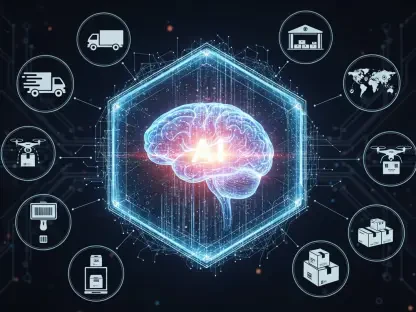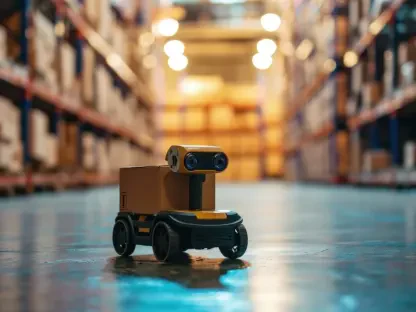The logistics industry is grappling with multiple pressures, including rising fuel costs, frequent delays, and increasingly sophisticated cybersecurity threats. In this context, Artificial Intelligence (AI) is emerging as a vital tool not only for automation but also for making real-time decisions that can prevent losses before they occur. This article delves into how AI is transforming the logistics sector, cutting operational costs, and addressing cybersecurity risks while also highlighting the vulnerabilities introduced by AI-driven systems.
Transformative Impact of AI in Logistics
The transformative impact of AI within the logistics industry is substantial and far-reaching. Companies that have incorporated AI into their logistics operations report impressive statistics, such as a 30% reduction in delivery times and a 12% decrease in fuel costs. AI-driven fraud detection systems play a vital role in reducing supply chain losses by up to 40%. These figures illustrate the significant potential for AI to enhance efficiency and cost-effectiveness within the sector.
AI technologies such as machine learning, predictive analytics, and automation streamline various logistics processes. One notable application is the optimization of route planning, which reduces fuel consumption and delivery times. Predictive maintenance powered by AI also identifies potential equipment failures before they occur, thus avoiding costly downtimes. This proactive approach ensures continuous operation and minimizes disruptions across the logistics supply chain.
Moreover, AI-driven demand forecasting enables companies to manage their inventory more efficiently, reducing the costs associated with overstocking or stockouts. By analyzing historical data and market trends, AI can predict future demand with high accuracy, facilitating better resource allocation. The integration of these technologies means that logistics companies can operate more smoothly, even in a volatile market, ultimately leading to substantial cost reductions and increased customer satisfaction.
Cybersecurity Risks in AI-Powered Logistics
Despite the numerous benefits, the adoption of AI in logistics has introduced new cybersecurity risks that companies must address. As logistics firms increasingly rely on AI-driven systems like automated warehouses, cargo tracking, and self-driving vehicles, they become susceptible to sophisticated cyber threats. Historical cyberattacks, such as the NotPetya ransomware attack on Maersk, which cost the company over $300 million, underscore the potential scale of damage that can be inflicted by these threats.
In particular, adversarial AI attacks pose a unique risk where hackers manipulate AI learning models to introduce errors in decision-making processes. Such attacks can result in delayed deliveries, mismatched shipments, and unnecessary fuel consumption, potentially costing businesses millions. Cybercriminals can also target the connectivity of logistics networks, exploiting a single vulnerability to compromise an entire system. This growing attack surface necessitates robust cybersecurity measures tailored to protect AI-driven logistics operations.
The rising prevalence of these risks highlights the importance of a proactive approach to cybersecurity. Logistics companies must stay vigilant and prioritize the protection of their AI-driven systems. This includes regular security audits, investing in advanced AI-driven security solutions, and ensuring that employees understand the importance of cybersecurity. By doing so, companies can mitigate the risk of cyberattacks and maintain the integrity of their logistics operations.
AI’s Role in Enhancing Cybersecurity
While AI systems in logistics present new cyber risks, AI is also an essential tool for enhancing cybersecurity defenses. Companies are deploying AI to detect anomalies, prevent fraud, and monitor logistics networks for suspicious activities in real time. For example, AI-powered fraud detection systems can automatically scan supply chains for unusual shipment patterns, unauthorized reroutes, and manipulated cargo tracking data, effectively preventing theft and ensuring the security of valuable goods.
AI-driven security platforms are also pivotal in predicting and preventing ransomware attacks. By analyzing vast amounts of behavioral data, these platforms can identify potential threats before they execute, thereby mitigating the risk of significant disruptions across the supply chain. Given projections that cybercrime damages could reach $10.5 trillion annually by 2025, integrating AI-driven security into logistics operations is crucial to safeguard against these escalating threats.
Furthermore, AI can enhance the security of autonomous fleets, which are expected to reduce shipping costs by 20-25%. However, without proper cybersecurity protocols, these fleets are vulnerable to hacking that could cause accidents or reroute deliveries. Logistics companies must invest in AI-driven cybersecurity solutions to protect their fleets and digital infrastructure. By balancing AI’s efficiencies with strong protective measures, the industry can harness AI’s full potential while maintaining security.
The Necessity of Robust Cybersecurity Frameworks
As logistics moves toward an AI-driven future, securing these AI systems becomes non-negotiable. Regulatory frameworks, like the EU’s AI Act, are already enforcing stringent compliance measures that mandate logistics companies to safeguard AI systems, particularly in automated transportation and warehouse operations. This evolving regulatory landscape underscores the urgency for logistics firms to adopt comprehensive cybersecurity frameworks.
A multi-layered approach to cybersecurity is essential in this new era. This strategy incorporates traditional security measures alongside advanced AI-driven solutions. Regular security audits, employee training programs, and the implementation of sophisticated threat detection systems are all critical components of a robust cybersecurity framework. These measures not only fortify defenses but also foster a culture of security awareness within the organization.
Investing in cybersecurity measures demonstrates a commitment to protecting both the company’s assets and its customers’ trust. In an industry where timely and secure delivery is paramount, showcasing a robust cybersecurity posture can serve as a significant competitive advantage. Logistics firms that prioritize the security of their AI systems will likely gain a foothold in the market, building stronger relationships with partners and clients who value reliability and security.
The High Stakes of AI in Logistics
The logistics industry is currently facing numerous challenges, such as escalating fuel prices, persistent delays, and increasingly complex cybersecurity threats. Given these difficulties, Artificial Intelligence (AI) is becoming an essential asset, offering benefits like automation and enabling real-time decision-making to proactively address issues before they result in significant losses. The application of AI in logistics is not just a trend but a transformative force reshaping the industry. Through its implementation, companies can significantly reduce operational costs and enhance their ability to manage cybersecurity risks. However, it’s important to note that AI-driven systems come with their own set of vulnerabilities. This article explores the multifaceted impact of AI on the logistics sector, examining both its advantages in cost-cutting and risk management and the new challenges it introduces in terms of cyber threats.









